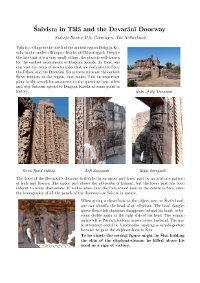| Author | Natasja Bosma |
| Title | Saivism in Tala and the Devarani Doorway |
Abstract
Tālā is a village in the north of the ancient region Dakṣiņa Kosala, which omprises the modern province Chhattisgarh and the districts Sambalpur, Balangir and Kalahandi of Orissa. It is situated north of the confluence of the rivers Maniārī and Śivanātha. Despite the fact that it is a very small village, the place is well-known for the earliest monuments of Dakṣiņa Kosala. In Tālā, one can visit the ruins of two temples that were dedicated to Śiva: the Jiṭhānī and the Devarānī Since these ruins are the earliest Śaiva remains in the region, that makes Tālā a very important place in the search for an answer to the question how, when and why Śaivism spread to Dakṣiņa Kosala at some point in history.
Both from a devotional and an iconographical point of view, the doorway of a temple is of great importance. Entering the temple is a transition from public to divine: the doorway leads the devotees to the heart [garbhagṛha] of the temple, the place where they can meet and communicate with their god. Also, the doorways of temples are usually adorned with beautiful images and panels. The iconography of these images and panels could give some clues about the nature and religious affiliation that belongs to the deity that used to reside in the temple. In the case of Tālā, the ruin of the Devarānī still has its beautiful doorway in a relatively good condition. It shows us some unique panels that have caused several discussions about the way they should be interpreted.
Since, among others, the iconography of the panels on its doorway point to the Śaivite nature of the Devarānī it raises the question which early form(s) of Śaivism spread to Tālā, and presumably from there to other parts of Dakṣiņa Kosala. It would also be interesting to get an answer to the question where this Śaivism of Tālā originated. Based on some new interpretations of the Devarānī doorway, an attempt will be made in this paper to give a preliminary answer to these questions.
